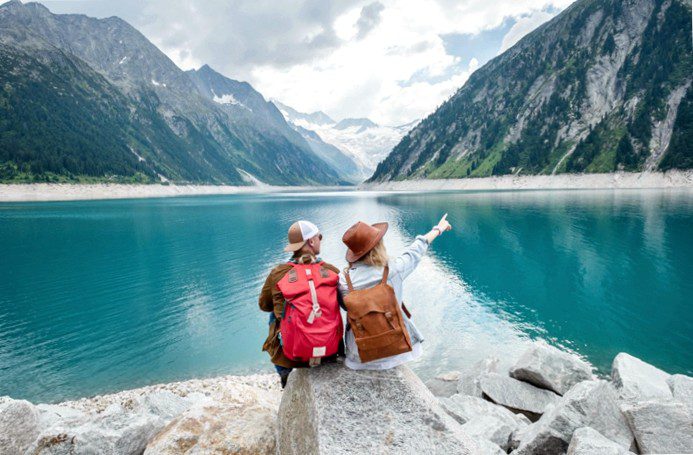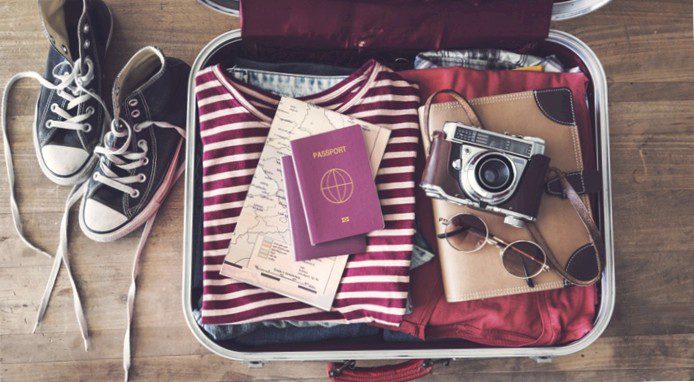Simply away! Out of the daily routine and into a new adventure. Who once got the taste, usually becomes downright addicted to traveling. Because never else do you feel as free and full of drive as when exploring new countries and cultures.
The times you spend traveling will be remembered for the rest of your life. They are those times you will still tell your grandchildren about one day. So if you haven't planned a trip for a while – or even never – it's urgent time (again). With our tips your travel planning will succeed with a minimum of effort and money – so that your next adventure can start shortly.
Every trip is an unforgettable adventure
If you've ever traveled, you know that feeling that creeps up on you a few hours, days, or even weeks before you leave. It's a mixture of anticipation, excitement and perhaps respect – for what you'll experience and the challenges you'll encounter.
Because one thing is for sure: no trip goes smoothly. There is always one or the other obstacle that you have to overcome, either already during the planning or afterwards on site.
Exactly these imponderables are it, however, which let you mature as a person. If you have mastered the challenges, you will be a more confident and independent person afterwards.
"Travel educates", is not without reason a well-known saying. You get to know yourself better, but also a new country, foreign people, exotic cultures and much more. So be it alone, with friends or your partner. Be it to the other end of the world or within Switzerland. Be it for a weekend, a week, a month or a year: every trip is an unforgettable adventure that enriches your life – guaranteed!
No big trip without the right preparation
There are a thousand inspiring reasons to travel. But first and foremost, traveling is simply fun. If you leave your home country every now and then, you can completely switch off from obligations such as job or household and escape from stress.
However, a trip in advance can also mean stress at first. Because it needs to be carefully planned. The longer and farther away you want to travel, the more effort you usually have to put into organizing it. But don't worry: the preparation is worth it, because as soon as you're on the plane, all the stress is forgotten.
So planning is key if you want to go on a major trip. For this reason, the following checklists and tips should help you prepare – whether this is your first trip or you have previous experience, what your destination is, how long you plan to be gone for.
Because what applies to a big trip, you can of course also break down to a smaller trip. In this sense: Have fun planning and especially traveling!

The first step: free up time
Many people would like to travel more, but there is always a reason that supposedly speaks against their intention: Mostly it is either too little money or too little time. How you can travel as cheap as possible, you will find out later.
But now you have to deal with the time problem first. The first important step is to find a period of time in which you can and want to travel. Sometimes this is quite simple, because you will soon have three months of semester break, six weeks of summer vacation or four weeks of vacation anyway.
In many other cases, however, you will have to actively find the time you need – for example, by cleverly taking advantage of bridge days. However, it is often particularly difficult if you are planning a longer trip that is to last several weeks or even months.
Then maybe your job is getting in the way because you can't take enough paid vacation time. Or you have children who have to go to school. But don't worry, because it is almost always possible to go on a trip. For example, you have the following options:
- If you have children, you can use the time to travel before they start school. But choose the destinations in such a way that they are safe for the children and, of course, also exciting. This gives you important "quality time" as a family and unforgettable memories.
- If your children are already of school age, you can align yourself with the vacation periods. Especially in the summer you will have six weeks of free time to explore the world together.
- For older children who are already more independent, you may be able to travel on your own – without your family. For two, three or even four weeks, they can take care of themselves after a certain age and are often even happy to finally have a "storm-free" day. Supervision is still necessary, so they don't party wildly or get into other mischief. You also need a contact person in case of problems. Depending on your family situation, grandparents or other trusted people may be able to step in during your absence.
- If your job gets in the way instead or in addition, you can also enjoy various possibilities to free up time for traveling. On the one hand, you can of course simply submit your vacation – after all, you have a certain number of paid vacation days per year at your disposal.
- If this time is not sufficient for the planned trip, you can also make individual arrangements with your employer. So have a private conversation and ask, for example, about unpaid vacation or the possibility of combining two annual vacations.
- Models such as a sabbatical or a long-term overtime account are also popular ways to get a little more time off than usual, which you can then use to travel.
- If, on the other hand, you are still a pupil or student and would like to go abroad for a longer period of time than just the (semester) vacations, you can, for example, do an exchange year, apply for a semester abroad or take a semester off. The options available to you in each case depend primarily on your school or college or university.
So, with a little creativity and courage, it is possible in most life situations to carve out at least a few weeks, or perhaps several months, for travel. If you can't or don't want to do that, you can of course simply use extended weekends or your regular vacation or vacation periods to travel.
However, the rule of thumb is: the shorter the travel time, the closer the destination should be. For a long weekend, for example, a flight to Berlin or Barcelona is worthwhile, but not to Australia, Canada or Thailand.
The second step: Clarify financial issues
Now that you've got the first problem out of the way – the lack of time – there's still the question of money. In some cases, you may continue to receive your regular salary or be able to draw support payments while abroad. So you can continue to cover your running costs and finance your trip from that or from your savings.
By the way, as a rule of thumb, you should always have enough money saved up to book a return flight if necessary. If, on the other hand, your regular income is interrupted during your trip, for example because you are taking unpaid leave, or if you do not yet have your own income, you have the following options:
- You can work before you travel, for example during the vacations, on weekends or after you graduate from high school, in order to save enough money.
- Alternatively, you have the possibility to work during the trip. You can rely on classic "Work& Travel" destinations such as Australia and travel from place to place during the trip. Or you can look for a real job at a fixed destination. This can be a part-time job like waitressing, but also a paid internship or something like that. This work experience abroad will also look great on your resume afterwards!
- It is also helpful to minimize the running costs during your absence. Maybe you can sublet your apartment or sell your car. Also insurances can sometimes be suspended for a longer stay abroad.
If possible, try to reduce your costs during a longer absence – both those for the trip and the running costs at home. Then check if you can cover them from your savings or anticipated income.
If you can't get off the ground financially in this way, you should consider models such as "work&life" Thinking about "travel. Taking out a loan may also be an option for people with steady jobs. And finally, of course, it is important to save as much as possible when traveling.
How to do it? It's simple: You should live as frugally or even more frugally while traveling as you do in your everyday life. It doesn't have to be the expensive luxury hotel, you don't need a massage every day and you don't always have to eat in a restaurant in the evening.
Instead, you can travel on a minimal budget by, for example, booking cheap or even free accommodation, cooking your own meals and using public transport. Of course, if you can afford more luxuries, that's perfectly fine. But if not, this strategy will still allow you to have a great trip on a budget.

The third step: Rough travel planning
Now that time and money are no longer a problem, the fun part of traveling can begin. Now it's time to plan your trip, at least roughly. So you are spoiled for choice:
- Where do you want to go?
- Do you want to stay in one place or make a round trip?
- How will you get around?
- What accommodations to choose from?
So now is the time when you need to set the parameters of your trip. How much flexibility you retain is a matter of personal taste. Some people like to book the whole vacation directly, so that they don't have to worry about anything when they get there.
Others prefer to see where their journey will take them, what kind of people they will meet or if they like it so much that they want to stay longer than expected.
It's up to you to decide how precisely you want to plan your trip now. What you should book are your flights and at least the first one or two nights on site. Because one thing is for sure: After a long flight, with a lot of luggage under your arm and a heavy jetlag, you definitely don't feel like looking for a place to sleep.
If, on the other hand, the first one, two or even three days are already planned, you can recover and acclimatize in peace and then set off on the actual trip with fresh energy.

The fourth step: book cheap flights
As soon as the key dates of your trip are set, you should look for flights. Although there are also always favorable last minute offers. In most cases, however, the earlier you book a flight, the cheaper it is. Depending on where you want to go, you can find a cheap deal by opting for the often unpopular flights with a stopover or an open jaw flight.
Incidentally, the same applies to other types of travel – for example, by train or bus. A certain contingent of particularly cheap tickets is quickly gone after a short time. So here, too, it is a matter of being quick to save costs.
The fifth step: Clarify organizational matters
But before you can actually leave, there are many other organizational to-dos to be checked off in the course of your travel planning. The shorter the trip and the closer the destination, the less planning is usually necessary.
However, if you are leaving for a foreign country or want to stay away for a long time, you will have to put a lot more work into the organization beforehand. So what are the most important points?
- You'll need to apply for a passport and any required visas in time, depending on your destination. You should allow at least eight weeks for this trip.
- See a doctor for advice on travel vaccinations. These also need to be done in time. At best, you'll make an appointment with a specialist about twelve weeks before you plan to leave.
- Also check your insurance coverage. For long journeys or destinations outside the EU you usually need a special foreign health insurance. Trip cancellation or baggage insurance can also be useful – depending on the individual case. In contrast, you may be able to shut down some current insurance policies like auto insurance for the period in question.
- On your trip you will need money. Simply withdrawing money from an ATM, as in Switzerland, is not always possible (free of charge). For a longer stay, you may need to open a special checking account or apply for a credit card – which can also take several weeks. You should always have cash on you, but only in small amounts. Also find out how the cards are insured against misuse in case of an emergency and directly deposit the blocking numbers in your cell phone.
- Check if you need further documents for your trip and if so, which ones. You can research such information for example at the Foreign Office.
- These documents can then be put directly on your packing list. Because also you put on such a best early – so that you do not forget anything important in the stress shortly before departure. So always add to this list as soon as you think of something…
The sixth step: Packing including checklist
…then your packing list should most likely be complete at the time of departure. A basic checklist can be a good starting point for your planned trip. What you really need and what you don't really need depends on your destination, travel time and many other factors. The preparations then include further points:
- First, pack all the important documents such as your passport, visa, a copy of your vaccination card as well as your identity card, etc. a. You should also always write your flight ticket, booking confirmations for your accommodation and other documents for your trip on your packing list or put them directly in your hand luggage after you receive them.
- Furthermore you need all documents for your insurances like the health insurance abroad, but also emergency numbers, blocking numbers for bank cards, etc.
- As mentioned earlier, you'd best save this one into your phone in addition while you're at it. You can also use this opportunity directly to download helpful apps. The little helpers are available for a wide variety of everyday situations on the road. They should be downloaded however best still in the domestic WLAN. Otherwise, costs may arise due to roaming or the WLAN in your accommodation may not be powerful enough for this.
- After that you pack the appropriate amount of cash. It should be enough for food during the journey, possible expenses like entry fees. It is best to always have some, but never too much, cash in your pocket. As a rule of thumb you can calculate 50 to 200 euros. In addition, of course, you must not forget your bank cards such as the giro or credit card.
- If you are traveling to a country for which you need a visa, you should always have passport photos in your luggage.
- Finally, of course, you need all the things for everyday needs such as clothes and cosmetics, your smartphone with charging cable and a possible plug adapter, a first-aid kit with sunscreen or helpful utensils such as needle and thread.

Also, when packing, pay attention to the regulations in effect at the airport as well as when entering the country in question. In fact, many things you are not allowed to take in your hand luggage or at all. Otherwise you risk penalties like heavy fines or even being denied entry completely.
Sounds stressful? As mentioned earlier, any trip involves some planning. The bigger your project, the more organization is necessary. But you can be sure: All the stress is forgotten as soon as you set foot on the plane. Instead, you will gain an unforgettable life experience that you will certainly never regret. Rather you have to be careful not to get "addicted" to traveling as well. Because: "A long journey does not stop at the destination. A piece of us will always travel on in spirit," Andreas Bechstein once said!